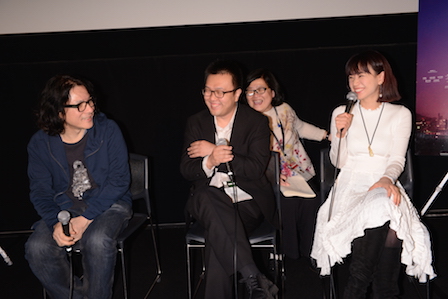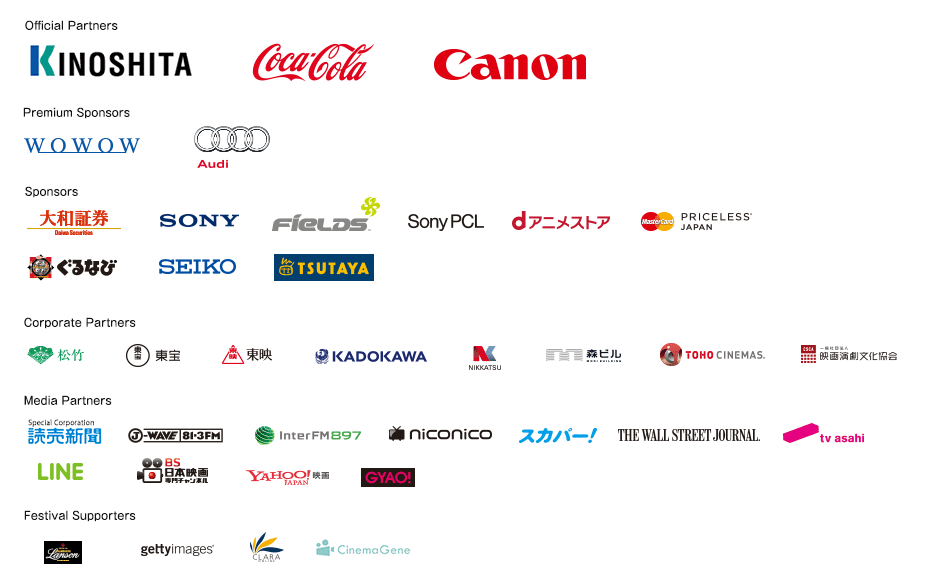“Young Love Lost” Q &A session took place on Oct 23, 2015

Xiang Guoqiang (Director, Screenplay), Li Meng (Actress), Shunji Iwai (Director, special guest)
-Greetings to the audience.
Dir. Xiang Guoqiang:I am Xiang Guoqiang and was able visit to Tokyo International Film Festival with my first film.
Li Meng:This wasn’t the first time for me to visit TIFF but is the first time to be here as an actress of the film. My name is Li Meng and I played the heroine of the film.
Dir. Shunji Iwai:I am acquainted with Li Meng and we met in Shanghai. I came here to see the film.
-Q&A
Where was the film shot? (Dir. Shunji Iwai)
Dir. Xiang Guoqiang:The film was shot in Qing Dao in Shandong Province but you can find similar government operated factories all over China.
How did you get the role in this film?
Li Meng:When I first looked at the script, it was only the first draft but I was amazed with the magical wordings and contents. I went to meet the director and the director also felt that the character suited me.
I have also read the fiction which was adapted to the film on the internet, called “Shao Nian Ba Bi Lun” (少年巴比伦). The content of the adaptation is also loyal to the original fiction.“Shao Nian Ba Bi Lun” was the first novel for the writer and the film was a debut for Dir. Xiang as well.
Why did you choose Li Meng as the heroine of the film?
Dir. Xiang Guoqiang:The fiction was very popular on the internet for a long time. I asked the author if I could adapt it into a film. The author asked me who would be ideal for the role of Bai Lan. As the girl depicted in fiction was 22 to 23 years old , I started to scout for the right person. To be honest, there were not much of options for me, even throughout China. Finally, I watched Li Meng’s “Tian zhu ding” (2013) and found her to be unique and thought she was potential for the role of Bai Lan.
Tell us your impression of Li Meng in this film?
Dir. Shunji Iwai:She has a very creative mood as an actress. She looked wonderful in the silver screen and would like to work with her in future.
Li Meng:I would like to work for Mr. Iwai one day.
Have you encountered any difficulties for acting the role of Bai Nan?
Li Meng:I think the hardest part was portraying the sense of “apartness and indifference” of the character as I am a totally different person in reality.
For instant, there was a scene where the master of factory was injured in the film. This was shot in the rain and it lasted for a week. We shot bit by bit every day so the consistency of the character portrayal was very important. Besides, I also had a few sensational scenes with Lu Xiaolu (main actor) and needed to maintain a certain distant from him, not to show my passion yet I loved him in my heart. I was depicted as the mature person in relationship so I had to suppress my emotion. Lu Xiaolu was just a young factory worker and he wasn’t aware of the goal of his life yet. That was the difficult part.
In addition, there was a bed scene with Lu Xiaolu in midst of an earthquake and it was difficult to keep the emotion going with our crew members watching and working alongside.
How would you see the love between Lu Xiaolu and Bai Lan?
Dir. Xiang Guoqiang:Actually I have read the script for more than hundred times but could still find new definitions and meanings while watching the film with you today. The boy didn’t want to grow up but had no other choice but to turn into adult. Lu Xiaolu was living in a place that he wanted to flee so much from yet he had no way to escape from the reality. The situation of pursuing Bai Lin, an unattainable and untouchable goal, symbolized his real life, the going for goals that he could never reach.
How would you see the final scene of the film?
Dir. Xiang Guoqiang:The couple had no choice but to depart anyway in the final scene. All the things they did were unable to reverse the situation. For this reason, I executed the film in this way to make it look more sorrowful and tried to leave a scar in Lu Xiaolu’s heart to remind him of this relationship for his rest of his life.
What was the reason for setting the film in the 90s?
Dir. Xiang Guoqiang:I especially like the factory background of the film. As China is totally different from Japan, we live in a communist country, our destiny was decided by the background of our family. If your parents are factory worker, you will also become a factory worker in the future. That makes a lot of Chinese spend their whole life in one same place. It was how it looked like for the 90s. After the economic revolution in China, a lot of factories closed down and many employees were laid-off. The film was trying to present the transitional period of this important time in China.
There are quite a number of Chinese films shown in our TIFF festival, but there is not much theaters where we can go and see Chinese films in Japan. What is the impression, your image of Chinese films?
Dir. Shunji Iwai: In China, currently their film industry is really thriving, there are so many films that are in the making which can be rivaled with Hollywood. The number of movie theaters are growing. Genre such as in art films, good films are also made in Taiwan with great Taiwanese directors, of course also in mainland China!
We (Japanese film industry related people) receive their energy and so would like to continue a good relationship with them. Personally, I have friends with foreign, the Asian directors and this TIFF is often talked about on the table. I often heard about the love of their support for this TIFF. This sometimes makes me think that they (Asian film makers) are probably more in love than us, Japanese! What I feel is that we are weak on this aspect, appealing more to Japanese public to get us more acquainted. Need more publicity to widespread this great festival! I think the films are shown at TIFF is selected by probably most talented curators so I hope this will continue to thrive as it is in future.
What is the impact and influence of Japanese films on China? Its popularity for example?
Li-Meng:Both Japanese films and TV programs make great impact on Chinese films. Especially in the genre of the teenage romance, China is the first country to mimic (imitate) the story For the drama series, Tokyo Love story and for the film, Love letter is the most popular. Love letter is, I think it is our very first film of the Coming of age genre film! In other fields, what I like most among directors is the Kurosawa, Shohei Imamura and Yasujiro Ozu’s film to name but a few. As you can see, Japanese culture is really giving great impact on China in depth. Every time when I visit Japan, I am really moved by encountering Japanese culture especially the Japanese people’s manner, so I feel I kind of refreshed! As I heard that Director Iwai is fond of this film, I really wish that if I could work with him in future! When Ken Takakura passed away last year, many Chinese people were in mourn to his death.
Does Dir. Xiang like Miyazaki’s animation film?
Li-Meng:He is also directing special effect movies and would really like the Studio Ghibli. The best film he likes is Totoro. In Totoro, there was a scene with two girls -Mei and Satsuki were waiting at the Bus stop while raining and Neko Bus was arriving, I don’t know how many times I watched that scene!
In this film, there was a scene where the main character was smoking and his boss toss the helmet. It seems to be related to the film of Naushika’s last scene . Was this intentional?
Dir. Xiang Guoqiang:I use to draw manga and made animation as well and studied at Beijing Film Academy that is why I like animation very much. I am a big fan of Dir. Shunji Iwai’s “All About Lily Chou-Chou” (2001) and watched it over and over throughout the night with my friends.






















